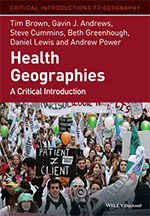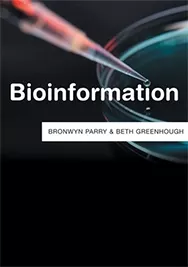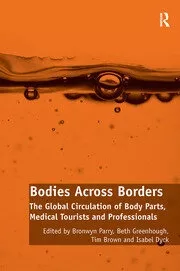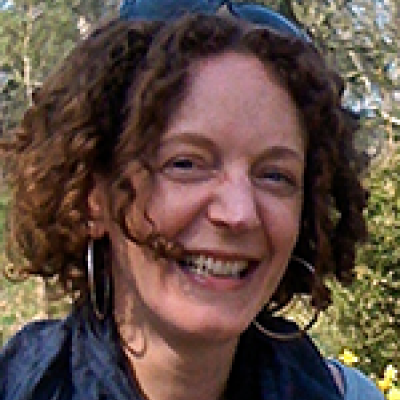Professor Beth Greenhough
Professor of Human Geography
Fellow of Keble College, Oxford
Professor of Human Geography
Fellow of Keble College, Oxford
Academic Profile
Beth Greenhough joined the School of Geography and the Environment in September 2014. She has a PhD (Human Geography) from the Open University, an MA in Society and Space from the University of Bristol and a BSc in Human Geography from the University of Reading. Prior to joining Oxford Beth lectured in Geography at Keele University and Queen Mary, University of London and held a post-doctoral fellowship at the Open University.
Beth's work draws on a combination of political-economic geography, cultural geography and science studies to explore the social implications of scientific innovations in the areas of health, biomedicine and the environment. Employing a range of qualitative, ethnographic and archival methods, Beth seeks to understand the social, cultural and ethical processes through which humans and animals are made available as experimental subjects for biomedical research. She also contributes to the development of new theoretical and methodological approaches within Geography better able to capture the material and affective dimensions of human-environment relations and how these are being reconfigured through biotechnological innovation. Her work has been funded by the AHRC, ESRC, Barts and the London Charity Trust, British Academy, the Brocher Foundation and the Wellcome Trust, and she published widely in many of the leading Geography and interdisciplinary journals. Beth has also served as an expert participant in debates around solidarity in bioethics (Nuffield Foundation) and Personalised Medicine (European Science Foundation).
Current Research
The Animal Research Nexus: Changing Constitutions of Science, Health and Welfare
This Wellcome trust Collaborative Award (2017-2022) is held in collaboration with Professor Gail Davies (University of Exeter), Dr Pru Hobson-West (University of Nottingham), Dr Rob Kirk (University of Manchester) and Dr Emma Roe (University of Southampton). Using animals in scientific research has been critical to the development of modern medicine and is contingent upon a complex, entangled network of relations and obligations across science and society. These entanglements can best be understood as the Animal Research Nexus. The research programme has three main aims: 1) to understand the historical interrelations between science, health and animal welfare 2) to identify challenges to animal research raised by scientific and social shifts around species and supply, professional roles, and patient engagements and 3) to facilitate dialogue with stakeholders, scientists and publics across the Animal Research Nexus. The overall programme seeks to identify what is required to remake the social contract around animal use in 21st century science and medicine. We will be working with 5/6 post-doctoral research assistants and 2/3 PhD students, with Bentley Crudgington as creative facilitator, and engaging perspectives across the animal research nexus to answer some of the questions we raised in this collaborative paper.
Good Germs, Bad Germs: Participatory metagenomics for the domestic microbiome
This project led by Dr Jamie Lorimer and in collaboration with Dr Richard Greyner and Dr Timothy Hoggetts (School of Geography and the Environment, University of Oxford) aims to bring new scientific techniques for surveying microbial biodiversity out of the laboratory to explore how they can shape everyday understandings of domestic life and kitchen hygiene. The project, www.goodgerms.org, will develop novel methods that will allow people to experiment on the microbial life in their kitchens and to visualise the results, and then explore the implications of this participatory approach with key stakeholders in industry and the regulatory agencies.
Exploring how laboratory animal technologists put ethics into practice
This project (2013-2015) is a collaboration with Dr Emma Roe (University of Southampton) and funded by the Wellcome Trust. It uses a compilation of in-depth interviews and participant observation to try and understand how laboratory animal technologists 'do the right thing' or put animal welfare and ethics into practice through developing their professional skills and sensitivities. Beth is also a founding member of the LASSH network which is developing an agenda for Social Science and Humanities Research into laboratory animal care and welfare.
The legacies of the repatriation of human remains
This project (2013-2016) is a collaboration with Professor Catherine Nash (Queen Mary University of London) and the Hunterian Museum at the Royal College of Surgeons, and is funded by an AHRC funded Collaborative Doctoral Award. Sarah Morton (PhD candidate) will use archival and ethnographic methods to explore how repatriation is put into practice and what happens subsequently to repatriated remains. The project will show how human remains are socially and materially constructed and the different meanings and associations repatriated remains hold for different stakeholders in the repatriation process.
Promoting breast awareness and early presentation among Black women 25-50: A survey and intervention study in City and Hackney
This is a collaborative project led by Mr Markus Ornstein (Homerton University Hospital), and working with Prof. Stephen Duffy (Wolfson Institute of Preventative medicine) and Professor Isabel Dyck, Dr Tim Brown and Melanie Dembinsky (School of Geography, QMUL). The project aims to trial and evaluate a public-health information DVD, produced by Homerton Hospital in order to raise breast awareness amongst Black women. Beth is leading the qualitative arm of the project, conducting interviews and focus groups with practice staff and patients to explore the impact of the DVD on their health knowledge and to gage their responses to the DVD. The pilot study (2012-2013) and main project (2013-2015) have been funded by Barts and the London Charity Trust.
Geographies of medical research: The Common Cold Unit 1946-1990
This project draws on the archives of the MRC's Common Cold Unit to explore the spaces created though medical research. It examines how volunteers were recruited for common cold research and the unit's experimental spaces, protocols and practices. A key insight from the research so far has been the ways in which participation in medical research shapes science-society relations, blurring the distinction between scientific research and health care.
Doctoral and Post-Doctoral Research
Beth's PhD and post-doctoral research at the Open University explored the controversies surrounding Iceland's (1998) Act on a Health Sector Database, and its proposal to license a private sector firm to access anonymised public medical records for use in gene-discovery research. Her work argued that how and where humans and their derivatives become resources for medical research is central to understanding social and cultural responses to this use of bioinformation, human tissue and human subjects and their ethical implications.
Teaching and Supervision
Undergraduate
For the Final Honour School, Beth contributes to the 'Environmental Geography' foundation course and to an option, 'Geographies of Nature' led by Dr Jamie Lorimer. Beth also shares responsibility with her colleagues at Keble for providing tutorials for the Preliminary Examination and Final Honour School of Geography.
Postgraduate
Beth convenes and lectures on the 'Science and Politics' core course for MSc Nature, Society and Environmental Policy. Beth also offers an elective course to SoGE Masters students in 'Animal Controversies'.
Beth welcomes enquiries from individuals wishing to undertake doctoral or post-doctoral research in any of the following areas: geographies of biomedical science; the production, circulation and use of human subjects and bodily commodities in medical research; human-environment relations; and social and cultural geographies of disease.
Current Graduate Research Students
| Oscar Hartman Davies |
Ocean Sentinels: Seabirds and smart oceans governance in the Southern Hemisphere |
| Raffaele Ippolito |
Global Environmental (in)Activism: An Ethnography of Pollution, Illness and Community Resistance in Italy and Taiwan |
| Hibba Mazhary |
Distancing death: welfare, slaughter and consumption in the British halal meat industry |
| Theo Stanley |
The epistemic politics of nature-based solutions: Knowing carbon in Scottish land governance |
| Annie E.A. Welden |
Animal Infrastructure: The animals enrolled as Nature-based Solutions |
| Ivin Yeo |
The digitally mediated city: rethinking posthuman urban life and wellbeing through Singapore's smart green and blue spaces |
| Sarah Morton | The Legacies of the Repatriation of Human Remains (AHRC Collaborative Doctoral Award 2013-2016) |
Recent Graduate Research Students (since 2006)
| Joshua Evans Completed DPhil in 2022 |
Taste Shaping Natures: A multimodal ethnography of translated fermentation in the New/er Nordic Cuisine |
| Andrew Dwyer Completed DPhil in 2019 |
Malware Ecologies: A Politics of Cybersecurity |
| Peter Martin Completed DPhil in 2019 |
Arctic science in circulation at the Royal Geographical Society c. 1880-1914 |
| Cyrus Nayeri Completed DPhil in 2019 |
Governing the ungovernable: investigating the geopolitics of volcano hazard management on Iceland's South Coast |
| Matthew Shepherd Completed DPhil in 2019 |
Geothermal Urbanism: Making the elemental explicit in Reykjavík |
| Sarah Morton Completed DPhil in 2018 |
The legacies of the repatriation of human remains from the Royal College of Surgeons of England |
Selected Publications
(Please contact me if you cannot get access to any of these publications)








